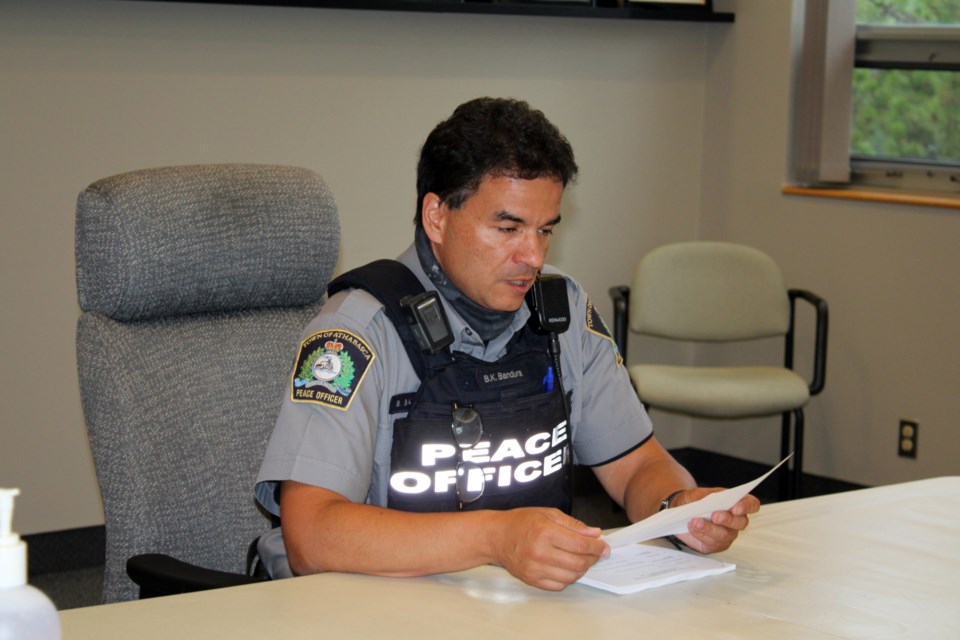ATHABASCA — For over three years now, community peace officer Brian Bandura has been helping to enforce the bylaws of the Town of Athabasca, alongside provincial laws that don't require the authority of the RCMP.
But what is the difference between the various levels of law enforcement and how does someone keep track of the various bylaws, laws, and acts which need to be enforced?
“There's a common misconception about bylaw and provincial. When you look at the three tiers, you start at the municipal level which includes a lot of municipal statutes for bylaws, everything from administrative processes within the town, to processes for taxes, to processes for dealing with land use, to legislation dealing with parking, animals, et cetera,” Bandura said in a Dec. 9 interview.
RCMP are federal, the sheriffs are provincial and then there are bylaw officers and peace officers who work for municipalities.
“Everything from forestry acts, Alberta Environmental Protection Act, Traffic Safety Act (TSA),” he said, describing everything in his enforcement domain. “TSA alone is one huge document and the Provincial Offences Procedures Act is also new. There's all kinds of stuff dealing with the Peace Officers Act as well for the province in terms of how they run, conduct, and what they're allowed to do and what they're allowed not to do.”
Bandura started with the town in 2019 as a bylaw officer before being approved by the province to be a peace officer.
“Peace officers such as the RCMP and some police — Calgary Police, Lethbridge (Police), they have the authority to deal with federal legislation, everything from transportation, to fisheries, to Criminal Code stuff (like the) Controlled Drugs and Substances Act which is also married up with Criminal Code,” said Bandura.
He uses the analogy of the difference between a doctor and a nurse to describe the differences between federal, provincial or municipal peace officers, saying they all deal with helping people but the scope of work for the doctor, or RCMP, is quite a bit more.
Bandura didn’t come into being a peace officer in a traditional way, he was originally an electrical engineer but volunteered with the St. Albert RCMP and decided it was his way in to give back more to the community.
“It’s basically going from engineering technology to applied humanities,” he said.
He went on to become an RCMP member himself, but after a year left to become a community peace officer, as he found it afforded him more opportunities.
“I always wanted to get involved in the community and when I was living in St. Albert years ago, the RCMP had a program called the Auxiliary Constable Program, he said. “It's very analogous to the Athabasca Fire Department where you have volunteers, you go and do your thing and work on weekends, work on days, nights, when you can. A certain minimum number of hours is required to do that, so I was getting a lot of hours and I was thinking to myself, you know, this is pretty cool.”
He said he enjoys the variety which can come on any given day as a peace officer.
“My scope is everything within municipal and provincial statutes meaning one minute I can be dealing with sidewalk complaint; snow and ice on the sidewalk, to dealing with an overloaded commercial vehicle which needs to be weighed and determine whether the vehicle is overloaded based on its permits.”
Bandura said he prefers, when possible, to educate people before handing out a ticket, either provincial or municipal.
“I'm thinking that we are seeing a change in driver behaviour,” he said. “I do notice that driver behavior and stop signs have been improving.”
He would like to see people slow down in residential areas though.
"Once you get into the residential areas, there is still snow and we need to be careful even if the roads are in excellent shape,” said Bandura. “Stopping distances even with our wonderful ABS traction control, all-wheel drive, four-wheel drive, extremely good snow tires, there's only so much friction we can get on the snow and ice.”
He recalled the ice storm of 2019 when the fire department and himself were trying to reroute vehicles from the worst areas.
“I remember setting up traffic cones. I put the cones up on the hill and slowly watched them move and dribble all the way down and sit there. I just looked at the firefighters and we chuckled about it.”
Bandura is pleased though, after three years of educating and ticketing, that bylaws are being followed more, especially in winter with clearing sidewalks.
“I'm pleased to say from what I've seen is that a majority of people in town are doing a great job of managing themselves. All I can say is thank you to the local people in town, doing their job and being responsible,” Bandura said. “I’d also like to impress that when someone slips on your sidewalk, you're responsible for what can happen civilly, then you get sued. So, it's not only because of the bylaws because you should prevent putting yourself in an awkward position.”



